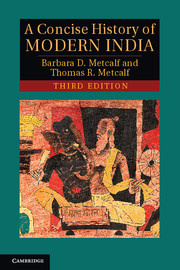Book contents
- Frontmatter
- Contents
- Illustrations
- Preface to the third edition
- Preface to the first edition
- Glossary
- Chronology
- 1 Sultans, Mughals, and Pre-Colonial Indian Society
- 2 Mughal Twilight: The Emergence of Regional States and the East India Company
- 3 The East India Company Raj, 1772–1850
- 4 Revolt, the Modern State, and Colonized Subjects, 1848–1885
- 5 Civil Society, Colonial Constraints, 1885–1919
- 6 The Crisis of the Colonial Order, 1919–1939
- 7 The 1940s: Triumph and Tragedy
- 8 Congress Raj: Democracy and Development, 1950–1989
- 9 Democratic India at the Turn of the Millennium: Prosperity, Poverty, Power
- Biographical notes
- Bibliographic essay
- Index
Preface to the first edition
Published online by Cambridge University Press: 05 November 2012
- Frontmatter
- Contents
- Illustrations
- Preface to the third edition
- Preface to the first edition
- Glossary
- Chronology
- 1 Sultans, Mughals, and Pre-Colonial Indian Society
- 2 Mughal Twilight: The Emergence of Regional States and the East India Company
- 3 The East India Company Raj, 1772–1850
- 4 Revolt, the Modern State, and Colonized Subjects, 1848–1885
- 5 Civil Society, Colonial Constraints, 1885–1919
- 6 The Crisis of the Colonial Order, 1919–1939
- 7 The 1940s: Triumph and Tragedy
- 8 Congress Raj: Democracy and Development, 1950–1989
- 9 Democratic India at the Turn of the Millennium: Prosperity, Poverty, Power
- Biographical notes
- Bibliographic essay
- Index
Summary
This is a concise history of India since the time of the Mughals. It comprises the history of what was known as British India from the late eighteenth century until 1947, when the subcontinent was split into the two independent countries of India and Pakistan, and of the Republic of India thereafter. (The history of Pakistan and, after 1971, of Bangladesh, is taken up in a separate volume in this series.)
In this work we hope to capture something of the excitement that has characterized the field of India studies in recent decades. Any history written today differs markedly from that of the late 1950s and early 1960s when we, as graduate students, first ‘discovered’ India. The history of India, like histories everywhere, is now at its best written as a more inclusive story, one with fewer determining narratives. Not only do historians seek to include more of the population in their histories – women, minorities, the dispossessed – but they are also interested in alternative historical narratives, those shaped by distinctive cosmologies or by local experiences. Historians question, above all, the historical narratives that were forged – as they were everywhere in the modern world – by the compelling visions of nationalism. The first histories of India, written from the early decades of the nineteenth century, were the handmaiden of British nationalism. They were subsequently challenged, and rewritten, by Indian nationalist historians. All of these histories, including those written from a Marxist perspective, were shaped by notions of ‘progress’ and what was seen as an inevitable progression toward presumably already known models of ‘modernity’ that included economic development and democracy. In recent years, Indian historians have taken the lead in breaking apart the old narratives, at the cost, some would argue, of a cherished cultural continuity and the stirring stories of heroism that foster patriotism. What they have given us in its place is what the leading ‘subalternist’ Partha Chatterjee calls ‘fragments’ of history. But such a history is no less critical for the formation of an informed citizenry of an individual nation, or of the world.
- Type
- Chapter
- Information
- A Concise History of Modern India , pp. xv - xxPublisher: Cambridge University PressPrint publication year: 2012

